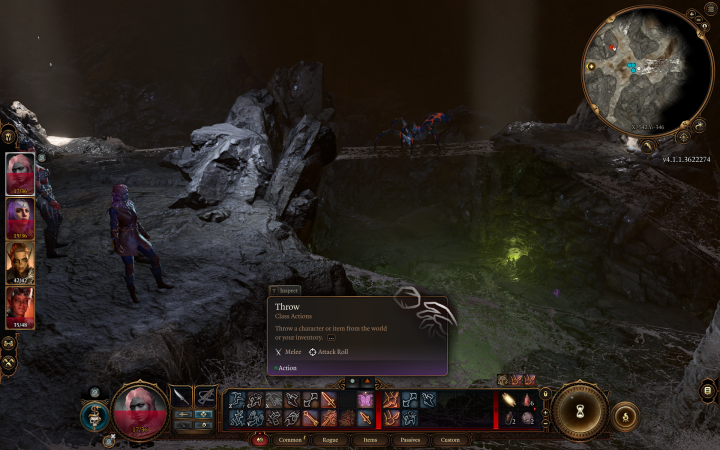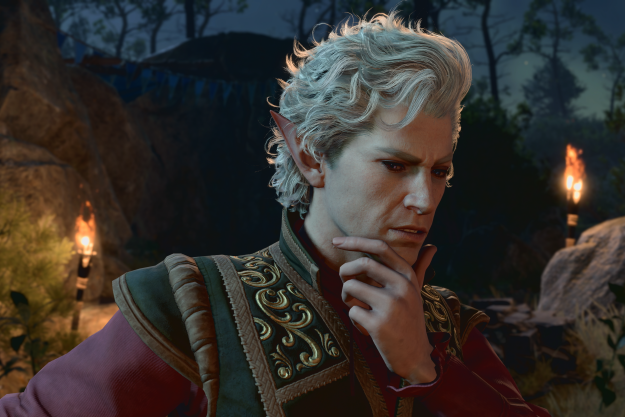If you’re looking to dive into Baldur’s Gate 3, but don’t have any knowledge of the series, don’t worry. The new CRPG tells a standalone story that doesn’t require that you have any knowledge of the series’ first two games. You might, however, want to be a little familiar with Dungeons & Dragons.
Baldur’s Gate 3 is the most comprehensive adaptation of the tabletop game ever made, heavily drawing from D&D’s 5th edition ruleset to build its own RPG systems. And while everything is explained in the game through tooltips, the mass of systems can be overwhelming if they’re totally new to you. You’ll have to learn a wealth of tabletop gameplay knowledge in a short time to start killing owlbears and charming your way through conversations.
If you don’t have time to read an entire rulebook, don’t worry. A lot of the gameplay systems seem scary at first, but are easy to explain. Here’s some basic information about Dungeons & Dragons that’ll demystify Baldur’s Gate 3’s opening hours.
Character sheets

Every Dungeons & Dragons campaign begins with a character sheet. Each player needs to build out their hero, choosing everything down to their starting items. Baldur’s Gate 3 replicates that experience in the context of a standard video game character creator, but there are a lot of details you’ll want to focus on. For one, the race and class you choose matter. Both of these will determine what kind of skills you can get and your starting stat spread. If you want to play a persuasive character who can talk their way out of a paper bag, for instance, you might want to play a bard. If you’re more of a stealth assassin, rogue might be for you.
Don’t stress about this too much, though. You will eventually have the option to change your class and respec your character later. Feel free to experiment early on and find a playstyle that best suits you.
Skill checks
Perhaps the most important thing you’ll want to know about is skill checks. In D&D, just about everything is determined by the roll of a dice. When a player wants to do something, the dungeon master running the game will set a number that they need to beat to succeed. Want to lie your way out of a situation? Roll a 20-sided die and hope it works out. Baldur’s Gate 3 adapts this quite literally, as you’ll actually roll a D20 on-screen to check your success. This idea is baked into a lot of video games, with “dice rolling” that’s invisible to the player. Here, you actually get to see the math play out.
The dice roll isn’t always the final number, though. Different modifiers can add or even subtract from the outcome. Some modifiers are based on your stats, with high ones giving you extra points on a roll and low ones potentially taking away some points. Modifiers can come from elsewhere too. Get your blood sucked out by a vampire and you’ll gain a temporary Bloodless trait, taking one point off every roll. Other characters can also provide support at times, acting as a bonus that adds their own dice rolls to yours. It sounds complicated, but Baldur’s Gate 3 does a great job at showing you exactly each bonus you’re adding when you make a roll.
Inspiration points

There’s one other thing to know about rolls: the importance of inspiration. In D&D, players can earn “inspiration points” that are handed out by the dungeon master in a variety of ways. These can be fairly flexible, with a dungeon master giving you one if they like something you did. Baldur’s Gate 3 has that system too, but with a more specific way to earn points. Inspiration is handed out when a character does something that’s true to their background. A Noble, for instance, might get an inspiration point for doing something that raises their social status.
Those points are extremely useful, as you can spend one to reroll any skill check. So, say you fail a high-stakes check. You can spend an inspiration point to essentially get a second try. Players can only hold four inspiration points at once, so don’t stockpile them. Use them when you’ve got them, because you’ll always get more if you role-play properly.
Combat options

If you’ve played a video game RPG, you probably think you have the basics of combat down pat. Attacks, spells, and items, right? Well, not quite. In D&D, you actually have a pretty massive range of things you can do outside of simply attacking. Baldur’s Gate 3’s greatest achievement (and most overwhelming aspect) is how well it brings that idea to a game. When you open up your action list, you’ll see a whole mess of commands you can issue. Some are straightforward, but others are nuanced. For instance, you can choose to make an improvised ranged weapon by throwing anything from your inventory at an enemy. Or you can dip your weapon in whatever element is nearby to enhance it.
You have tons of options that go far beyond standard attacks, so don’t ignore options that don’t have an immediate damage effect. Learn the full breadth of your commands and experiment with each during battle to see what they do. Sure, you can probably get through battles by simply using a basic attack, but where’s the fun in that?
Opportunity attacks
This tip is a literal lifesaver. In most RPGs, you might think that an enemy can only damage you on their turn. That’s not the case. D&D has a concept called “attack of opportunity” that you need to be aware of. If you’re standing right next to an enemy and you try to run away, they can essentially swipe at you while you’re vulnerable. You’ll often find yourself in situations where it’s better to stand your ground and fight rather than running away and taking a hit.
There is, however, a way to avoid opportunity attacks. The Disengage command in your action menu will allow you to safely get away without provoking an enemy attack. That’ll cost you an action, so you may not be able to attack during that turn, but it’s something you’ll want to use when you’re backed into a corner with low health.
Long and short rests

Healing in D&D isn’t quite so simple as picking up a health item. While you can get one-time-use potions, you’ll actually need to stop and rest your party to fully regain your strength. Baldur’s Gate 3 uses this same system, and it can be a little confusing if you’re not used to it. When you go into the main menu, you’ll see that your party can take two “short rests.” These will instantly restore some of your party’s HP, allowing for a quick refresh.
You’ll also see an option to take a “long rest.” That option will actually send you to a campsite. That doubles as a hub where you can change your party, adjust your class, and even bump into some story events. Once you’re ready to sleep, you’ll have to use some food from your inventory to fill your party up. A successful long rest will restore both your short rests, all HP, and refresh your spells. In short, use your two short rests to heal first, and jump into a long one once you’re out of those.
Preparing spells
Perhaps the most complicated aspect of D&D comes from how spells are handled. While characters will gain access to dozens of spells, they can’t actually equip them all at once. Rather, they’ll need to “prepare” a few by essentially slotting them into their inventory. Anything that’s not equipped can’t be used until it’s prepared, so choose your loadout carefully. Luckily, Baldur’s Gate 3 isn’t too strict about when you can prepare a spell. All you need to do is make sure that you’re outside of battle and aren’t in the middle of any action. From there, simply open up your spellbook in your menu and swap them around as you like.
That’s only scratching the surface of Baldur’s Gate 3. There are a ton of tabletop systems baked into the RPG that you’ll need to learn as you go. These tips should be enough to get you started, though, regardless of your Dungeons & Dragons history. Now go kill some mind flayers, you rapscallions.
Baldur’s Gate 3 is now available on PC. It’s coming to PS5 on September 6.
Editors' Recommendations
- Baldur’s Gate 3 isn’t getting DLC or a sequel from Larian, and that’s OK
- Staff picks: How Baldur’s Gate 3 beat the odds to become our 2023 Game of the Year
- One of the best games of the year is finally coming to Xbox next month
- The best games of August 2023: Baldur’s Gate 3, Sea of Stars, and more
- Baldur’s Gate 3 Patch 1 improves the game in over 1,000 ways




